In Conversation with Alison Morton
At the end of each month, I invite an author friend to join me in conversation about their latest book or other project of mutual interest. I hope this occasional series gives you interesting insights into what goes on behind the scenes in our writing world, and how authors work.
July’s guest is Alison Morton. Although we’re writing in very different genres – Alison writes contemporary and alternative history thrillers and I write cosy mystery – we share a love of penning series. What prompted today’s conversation is the recent launch of the third in her “Doubles” series of contemporary thrillers, Double Stakes.
 The story so far…
The story so far…Debbie: Your latest novel, Double Stakes, is the third in a trilogy that began with Double Identity and Double Pursuit. A trilogy is often thought by the world of traditional publishers to be a golden ticket in marketing terms, because of sell-through or read-through – i.e. a reader hooked by the first in series is likely to snap up books 2 and 3 without much persuasion. It’s far easier to sell the second and third books in a trilogy to a satisfied reader of book 1 than a new stand-alone or first-in-series.
But you and I have both gone beyond that magic number with our other series – your vast Roma Nova series and my Sophie Sayers cosy mysteries (nine books and many associated short fiction pieces) and St Bride’s school series (four of a planned six books published so far).
We’re in the very good company of Douglas Adams, who described his Hitchhiker’s Guide to the Galaxy series as “a trilogy in five parts”!
Will Mélisende’s trilogy stop at three books, or is she set to return?
Alison: Yes, Roma Nova grew and grew and now comprises eleven books. New ones would be spin-offs via other historical periods or following other characters’ adventures. The Doubles are open-ended. Mel is about to celebrate her thirtieth birthday but I can see several more missions before she hangs up her holster.
Debbie: An aside on naming conventions: when I licensed my St Bride’s series to Boldwood Books, which I’d begun with the simply-named Secrets at St Bride’s and Stranger at St Bride’s, they devised a new, more complex and commercial pattern for their titles, so now the four books so far are called Dastardly Deeds at St Bride’s, Sinister Stranger at St Bride’s, Wicked Whispers at St Bride’s, and Artful Antics at St Bride’s. Coming up with titles for the planned books 5 and 6 will thus require a pair of alliterative words that set the tone for each adventure – not easy!
You’ve had interesting – and challenging – naming conventions for each of your series. Tell us a bit about your Latin titles for the Roma Nova books, and the “Double” style for Mélisende’s adventures.
Alison: Ha! For the Roma Nova novels, I wanted Latin or Latin sounding names, preferably one-word, that would give the non-Latin speaker an idea about the story. INCEPTIO means the beginning – perfect for the first in the series and the start of Carina’s own life in Roma Nova. PERFIDITAS is made up, building on perfidia mean faithlessness or betrayal but there’s a famous song and a number of books called Perfidia. Adding ‘-as’ conveys a state of being such as romanitas means Roman-ness. SUCCESSIO doesn’t mean success! It’s more like succession which carries twin meanings of ‘what happened next’ and ‘the next generation’. Nothing to do with any TV series!
INSURRECTIO and RETALIO are pretty much self-explanatory as is EXSILIUM. I broke my one-word rule for JULIA PRIMA as there are so many books with ‘Julia’ as their title and my Julia was the first or prime ancestor of Roma Nova’s ruling family.
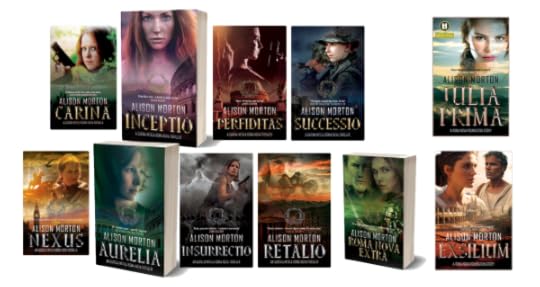 Fun fact: the titles are in upper case because in ancient Latin script there are only capital letters!
Fun fact: the titles are in upper case because in ancient Latin script there are only capital letters!As for the Doubles… Double Identity was a play on the famous thriller movie Double Indemnity. Also, the heroine has a split heritage and is never completely sure which one she belongs to. For Double Pursuit, I reckoned I had half the title in the first word! More realistically, she’s pursuing the bad guys, but somebody is pursuing her… Now I’d set the pattern, the following book had to be Double Something! The stakes are high as in any thriller, but the word also refers to gambling as well as political stakes.
Debbie: In between writing our novels, we share a love of penning short stories to stretch our writing muscles in a different way, and perhaps also as palate cleansers. But how we came to write them differs. I’ve always loved writing short stories and took a bit of self-persuasion to tackle the larger canvas of the novel (no holding me now, though!) Whereas at one time, you had to be dragged kicking and screaming to the shorter form but now are a frequent contributor to short story anthologies.
These are a great way for any author to broaden their reach, and the camaraderie involved in their production is fun too. We each have written very different tales responding to the brief of the new anthology Fate: Tales of History, Mystery and Magic, edited by our mutual friend Helen Hollick. I loved the premise (and execution) of your contribution. Can you please whet readers appetites by briefly describing it?
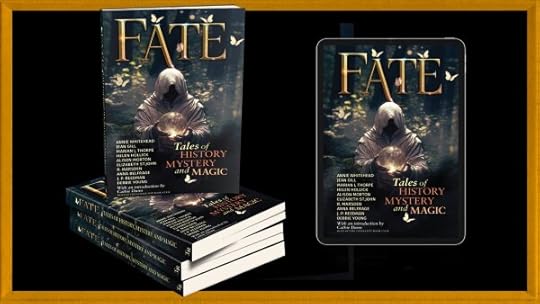 Click image to preview on Amazon
Click image to preview on AmazonAlison: Helen instructed us to go wild, so I did, but I can’t leave Rome out of any of my stories! The assassination of G. Julius Caesar is one of those iconic events in history, but suppose it hadn’t happened? What would be the consequences if it hadn’t? But would the Fates allow Caesar to be saved? Two young time-travellers are sent back from the alternative future to fix the problem. However, they keep getting sidelined or tripping over their togas. But the Fates, the Roman Parcae, are watching and they will not be mocked!
Debbie: Now I’m back to writing my next novel. What are you writing now?
Alison: I decided it was time to revisit Roma Nova, so I’ve started a new story featuring Carina, the heroine of the first four Roma Nova stories. I’m not a planner so I just plunge and discover how the story unfolds as I write it. At present it’s just over 5,000 words and I’m looking forward to seeing where it takes me.
Debbie: I look forward to finding out what Carina gets up to next!
Regarding WIPs (work-in-progress), I like to keep a talisman on my desk relevant to my current writing project. For my new novel, Death at the Village Christmas Fair, to be published by Boldwood Books on 16th August, my lucky charm was a small wooden bear, a replica of a Japanese netsuke. (The reasons will become clear when you read the book!) Do you keep any such tokens on your writing desk, or do you have any other writing superstitions of any kind?
Re broader superstitions, by the way, Lee Child’s famous conviction that he should start each new novel on 1st September each year didn’t do him any harm!
Alison: No – but I do make sure I have a cup of tea by my desk all the time!
Debbie: Some say we should write what we know. In my books I draw extensively on over three decades of living in a Cotswold village plus 13 years of working in a girls’ rural boarding school. What aspects of your real life inform your books?
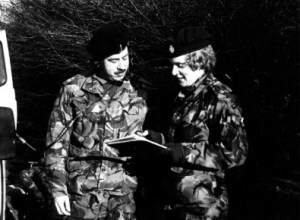 Alison: Well, apart from being a voracious reader of thrillers and historical fiction from a very young age, I served six years in a special communications regiment in the Royal Signals, so saw military life from the inside. The other strong influence is the Roman one. I’ve clambered over most of Roman Europe by now and I’m mesmerised by the whole 1200 years of it. There’s nothing comparable to running your hand over a section of 2,000-year-old Roman concrete…
Alison: Well, apart from being a voracious reader of thrillers and historical fiction from a very young age, I served six years in a special communications regiment in the Royal Signals, so saw military life from the inside. The other strong influence is the Roman one. I’ve clambered over most of Roman Europe by now and I’m mesmerised by the whole 1200 years of it. There’s nothing comparable to running your hand over a section of 2,000-year-old Roman concrete…
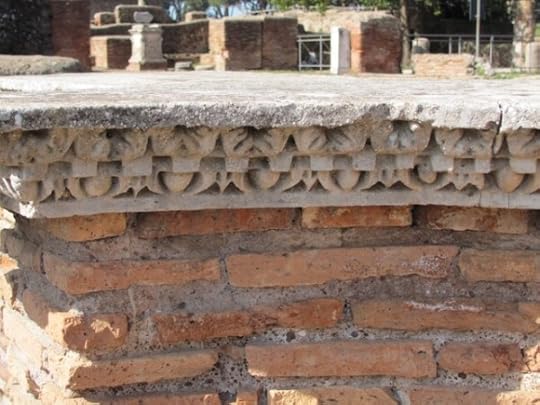 Roman concrete and brickwork
Roman concrete and brickworkDebbie: A not unrelated question: as a long-time British resident of France recently awarded French citizenship, to what extend do your dual allegiances drive the characters and themes of your novels?
Alison: The main difference is the mindset. French and British people roughly share the same Western values and ideas, so there’s a lot in common. French people are more formal in many ways and pride themselves on their professionalism. They’re also more polite! Woe to you if you fail to utter even a minimal bonjour when you enter a shop or office. They also tend to discuss round a subject thoroughly before reaching a conclusion, something that tend to make Brits impatient!
Lunch is very important, although the ‘sandwich at the desk’ is becoming more common in French cities at midday. Very sad.
In the Doubles thrillers, Mel seems at home in both environments, more so than her brother Arnaud. She serves in the French Army, but uses her English skills extensively. And she is familiar with French bureaucracy (which isn’t as bad as it’s reputed to be), but loves shopping at Marks & Spencer and Clarks when in the UK.
 Alison was keen on the Romans from a very early age
Alison was keen on the Romans from a very early ageDebbie: The philosopher Hegel said, “The only thing that we learn from history is that we learn nothing from history.” What can we learn from alternative history, and indeed from your Doubles series, which is contemporary fiction, that we do not learn from actual history?
Alison: Alternative history allows us a rich environment in which to develop our storytelling and let our imaginations soar in a historical and futuristic framework. Like all speculative fiction and a fair bit of historical fiction, ‘althist’ may well reflect concerns of the time when it’s written.
But above all it allows us to explore unthinkable, frightening or utopian worlds from the safety of our favourite reading chair.
The Doubles, firmly fixed in the present, have enabled me to look at contemporary issues which have a historical origin. I couldn’t help setting a chase in Trajan’s Market in Rome in Double Pursuit. It’s a spectacular and evocative building that’s survived two millennia! What does that say about history?
And Mel takes the side of the Celtic tribes when discussing the Romans with colleague Andreas. These are side conversations, but allow a divergence from the norm. Double Stakes goes into grimmer territory of the rise of the far right in Europe. This is brimming with historical echoes and we do well to consider their consequences in thinking back to the 1930s.
Debbie: Alison, finally could you please share a brief introduction to your latest novel and its place in your Doubles trilogy, with a single buying link for anyone wishing to find out more.
 A kidnapped daughter. A rigged election. A family under siege.
A kidnapped daughter. A rigged election. A family under siege.
Former French special forces intelligence analyst Mélisende is desperate for recovery time after a gruelling mission. But when enforcers attack her family home in rural France, she uncovers a shocking truth – her sister-in-law’s gambling debt has put them all in danger.
Before Mel can untangle the crisis, she is ordered to Germany, where the daughter of Achim Nessler – the front-runner for chancellor – has been abducted. The kidnappers’ goal? To force Nessler to throw the upcoming election, paving the way for a hard-right victory that could upend not just Germany, but all of Europe.
Racing against time, Mel and fellow investigator Jeff McCracken dive into the murky world of extremist politics where old wounds and new betrayals collide. But as their hunt leads them deep into eastern Germany’s shadows, Mel discovers a chilling link between the case and her own family’s troubles.
Now, with both a nation’s future and her loved ones at stake, Mel must risk everything to stop a conspiracy that hits closer to home than she ever imagined
What readers are saying about Double Stakes:
“The plot is complex and fast moving; and the political and geographical details are fascinating. This is a compelling thriller, a page turner, which I thoroughly recommend.” – Mystery People
“Mélisende is once again at the top of her game and with Jeff by her side, they are unstoppable.” – Avonna Loves Genres
About Alison MortonFind out more about Alison Morton and her books at her website, www.alison-morton.com, which includes links to her social media.
Sign up for her newsletter to receive two free stories:
The Sand Beneath her Feet, the prequel to the Doubles series and Mel’s last mission before leaving the French Army. Of course, it doesn’t go smoothly.Conrad & Carina’s Roman Holiday, in which two 21st century Praetorians delve into an ancient Roman mystery.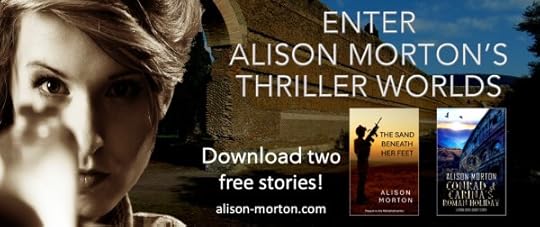 Click image to subscribe to Alison’s free newsletter now and receive these two free stories
Click image to subscribe to Alison’s free newsletter now and receive these two free stories



